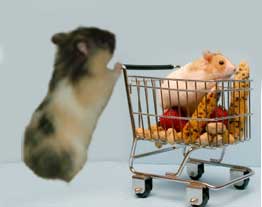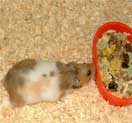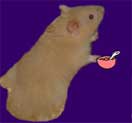| |
The Hamsters Diet

Human food hamsters can eat |

Food poisonous to
hamsters |

Feeding hamsters treats |

Feeding diabetic hamster food |
|
Most of the ailments associated with hamsters in captivity today can be attributed to the ignorance of modern day man, and our modern way of living. Almost 90% of the ailments of hamsters in captivity are directly or indirectly linked to the diet and the hamsters eating habits. Hamsters will eat or have a go at almost any food that is offered to them. They cannot decide for themselves what is bad or what is good for them, and care must be exercised when it comes to feeding your pet. Their diet is a major contributing factor in their dispositions and a correct diet is crucial for his health and well being.
In the wild: The Syrian hamster’s natural habitat is in the dry hot desert borders of Syria. Syria borders Turkey to the north, Iraq to the east, Jordan and Israel to the south. The terrain is mostly desert and home to many drought resistant plants. There is little wildlife and very little vegetation. The bulk of their diet is dry grasses seed and plant material. The country is mountainous in the south east and south west but otherwise largely flat. Syria is considered one of the most limited water resource countries.
Hamsters eat a diet of high fibre low fat foods so we should try to replicate that in captivity. Nearly all rodents feed on plant material seeds in particular. A pet hamster's diet consists mainly of grains and seeds, although a small amount of vegetable fibre can be added occasionally. Hamsters in captivity today are still descendents of their wild counterparts, and their instincts remain exactly the same, as do their nutritional requirements. Although their exact nutritional requirements are still not quite fully understood, we must try and emulate that of their ancestors from what we already know by maintaining a well-balanced diet.
When feeding hamsters keeping their food as natural as possible will increase your pet hamster’s chance of leading a long healthy and trouble free life. Feeding hamsters food that has been processed for human consumption is an absolute no-no! Also bear in mind that processed food contains additives, and processing also reduces the nutritional value of the food. Preservatives are added or created during the processing that can have adverse health effects on your hamster. Food processing is used mainly to produce attractive and marketable food products in which to give it a longer shelf life supermarket shelves; this is done by adding salts, sugars, colouring, and preserving agents in higher than safe or recommends quantities.
Carbohydrates, proteins, and fats are called the “Macro nutrients” all of these nutrients are necessary for life. Carbohydrates are needed to fuel the body and protein to keep the muscles and glands healthy. Fats are for hormone production and a healthy nervous system. Nuts seeds and low starch vegetables are usually the best sources of healthy fats since low starch vegetables are primarily alkaline thus supporting the liver, the main primary organ for cleaning the blood.
An adult hamster can eat around 10 - 12g per day. Most of the nutrients and vitamins that are needed for his well being are to be found in a good balanced diet, with a selected and varied addition of "fresh" human food to help keep your pet interested.
There are many types of hamster food mixes available on the market and a good quality one should be considered. The complete hamster food mix in good brand names like "Harry Hamster:" as this is a well-balanced full diet suitable for hamsters of all ages. The natural prebiotics in Harry Hamster promote healthy intestinal functions, eliminates harmful bacteria and thus supports the composition and development of a healthy intestinal flora. Harry Hamster is the only hamster food approved by the 'National Hamster Council'
Typical ingredients of a dried hamster food mix is corn, maize, dried peas, peanuts, sunflower seeds, locust beans, wheat seed, barley, alfalfa, dried fruit. A commercially prepared hamster food mix is usually accepted better and this is a good base for the diet.
A hamster food mix can be supplemented with a limited and selected addition of human food that hamsters are able to eat, such as cheese, cereals, selected fresh vegetables, boiled egg, wheat biscuits, corn-on-the-cob, unsweetened yogurt, nuts, wholemeal biscuits, unsweetened breakfast cereal, (cornflakes etc).
Hamsters will eat almost any cereal grain or plant material. Making your own hamster mix is not recommended as it is unlikely that you will provide the complete and balanced diet with all the nutrients that your hamster needs in the correct proportions. When it comes to feeding your hamster keeping his diet as natural as possible will increase his chance of leading a long and healthy life.
Hamsters are natural hoarders. Indeed the word "hamster" is derived from the German verb "hamstern" which means "to hoard". They are very possessive and protective over their food hoard. A hamster will find a place to store any food he has collected. This may be in a corner of the enclosure. A small amount may also be taken into the nest. This food stored in the nest is kept close by, for their short periods of awakening during the day. This hidden hoard should always be replaced after any cage cleaning. Any food that has been stored in the enclosure should be gathered together, and put back in the same place that it was found once the cage has been cleaned. Removing the food hoard entirely may confuse your pet, this causes undue stress. Remove only any spoilt food, or perishable food. If there is an excessive amount of dry food stored, then it is safe to remove some of it, but always replace the bulk of it. Failure to replace the food store usually results in the hamster marking any food that may be stored in future. They will mark their food by urinating on or around it, this is a territorial marking behavior.
The hamsters cheek pouches can occasionally become impacted. They may become impacted with food or other material such as bedding becoming stuck within the pouch. The hamster may have difficulty in de-pouching. This may appear as a permanent swelling on the side of the face. It can be difficult to tell if the hamster is just storing or moving food.
Some of the food and products we eat, we take for granted that these are safe foods for us, and are not generally toxic to humans. But some of theses foods can be toxic, or hazardous to a hamster.
Feed baby hamsters the same food as you would feed an adult hamster.
|
|


